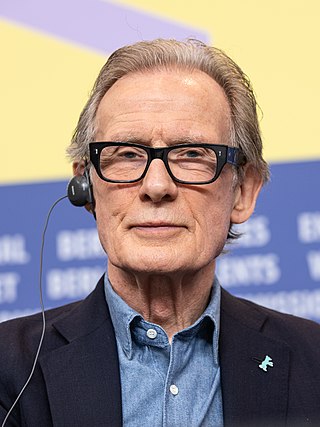Related Research Articles

Sir Michael John Gambon was an Irish-English actor. Gambon started his acting career with Laurence Olivier as one of the original members of the Royal National Theatre. Over his six-decade-long career, he received three Olivier Awards and four BAFTA TV Awards. In 1998, he was knighted by Queen Elizabeth II for services to drama.

Ralph Nathaniel Twisleton-Wykeham-Fiennes is an English actor, film producer, and director. He graduated from RADA in 1985. A Shakespeare interpreter, Fiennes excelled onstage at the Royal National Theatre before having further success at the Royal Shakespeare Company. Widely regarded as one of Britain's most well-known and popular actors, he has received various accolades, including a BAFTA Award and a Tony Award, as well as nominations for two Academy Awards and an Emmy Award.

Lynn Rachel Redgrave was a British-American actress. She won two Golden Globe Awards during her career.

William Francis Nighy is a British actor. Known for his work in numerous stage, television and film productions, he has received several awards including a British Academy Film Award and a Golden Globe Award, and also has had nominations for an Academy Award, a Tony Award and a Laurence Olivier Award.

Sir David Rippon Hare is an English playwright, screenwriter and theatre director. Best known for his stage work, Hare has also enjoyed great success with films, receiving two Academy Award nominations for Best Adapted Screenplay for writing The Hoursin 2002 and The Reader in 2008.

There have been four railway accidents at Potters Bar in England. Those in 1898 and 1946 were signals passed at danger. The accident in 2002 led to substantial public debate and a national change in policy relating to maintenance of infrastructure.
Joanne Whalley is an English film and television actress. She was credited as Joanne Whalley-Kilmer from 1988 to 1996 during her marriage to Val Kilmer.

Jennifer "Gemma" Jones is an English actress. Appearing on both stage and screen, her film appearances include Sense and Sensibility (1995), the Bridget Jones series (2001–2016), the Harry Potter series (2002–2011), You Will Meet a Tall Dark Stranger (2010), and Ammonite (2020).
Stuff Happens is a play by David Hare, written in response to the Iraq War. Hare describes it as "a history play" that deals with recent history. The title is inspired by Donald Rumsfeld's response to widespread looting in Baghdad: "Stuff happens and it’s untidy, and freedom’s untidy, and free people are free to make mistakes and commit crimes and do bad things.”

Sir Simon Russell Beale is an English actor. He has been described by The Independent as "the greatest stage actor of his generation". He has received various accolades, including two BAFTA Awards, three Olivier Awards, and a Tony Award. For his services to drama, he was knighted by Queen Elizabeth II in 2019.
The Joint Stock Theatre Company was founded in London 1974 by David Hare, Max Stafford-Clark Paul Kember and David Aukin. The director William Gaskill was also part of the company. It was primarily a company which presented new plays.
Catherine Russell is a British stage, television and screen actress.
Maxwell Robert Guthrie Stewart "Max" Stafford-Clark is a British theatre director.
Out of Joint is a British and international touring theatre company based in London. It specializes in the commissioning and production of new writing, interspersed with occasional revivals and classic productions.
Rakie Olufunmilayo Ayola is a Welsh actress known for her work in theatre and television and radio. In 2023 Rakie Ayola was the 18th recipient of the prestigious BAFTA CymruSiân Phillips Award. At the same ceremony she also won the Bafta CymruBest Actress Award for her performance in BBC1 series The Pact Season 2 on which she was an Executive Producer. In 2021 Rakie Ayola won BAFTABest Supporting Actress for BBC1 film Anthony by Jimmy McGovern. Ayola has appeared in television shows including Kaos, The Pact Season 1, Grace, Shetland, No Offence, Midsomer Murders, Black Mirror, Noughts + Crosses, Doctor Who, Silent Witness and EastEnders, a number of Shakespearean theatrical performances and feature films such as Been So Long, Now Is Good, Great Moments in Aviation, The i Inside, Dredd, and Sahara. She appeared as Kyla Tyson in the BBC medical drama Holby City from its eighth to eleventh series.
Portable Theatre Company was a writer-led company that toured alternative arts venues in the UK between 1968 -1973. Their aim was to present original and provocative new writing that challenged the staid mediocrity of mainstream theatre.
Ian Leslie Redford is an English actor who has featured on stage, in film and on television in various roles.

Theatre of United Kingdom plays an important part in British culture, and the countries that constitute the UK have had a vibrant tradition of theatre since the Renaissance with roots going back to the Roman occupation.

Stella Anne Feehily is an Irish playwright and actor. Her plays include Game (2003), which was produced by Fishamble Theatre company, Dublin, and was published in an anthology of first plays by New Island. She is the author of Duck (2003) and O Go My Man (2006), both of which were first performed in co-productions by Out of Joint theatre company and the Royal Court Theatre. O Go My Man was a co-winner of the Susan Smith Blackburn award in 2006.

Sonia Friedman is a British West End and Broadway theatre producer. On 27 January 2017, Friedman was named Producer of the Year for the third year running at The Stage Awards, becoming the first person to win the award three times. In 2018, Friedman was featured in "TIME100", Time Magazine's 100 Most Influential People of 2018 and was named Broadway Briefing's Show Person of the Year. In 2019, Sonia Friedman Productions was ranked The Stage 's most influential theatre producer in The Stage 100.
References
- 1 2 Ascherson, Neal (9 November 2003). "Whose line is it anyway?". The Observer . Retrieved 14 September 2019.
- ↑ "Previous Awards". Theatre Management Association. Archived from the original on 3 December 2013. Retrieved 1 October 2008.
- ↑ Staff Writers. "The Drama Award". Sony Radio Academy Awards. Retrieved 2 August 2009.
- ↑ Billington, Michael (20 September 2019). "The Permanent Way review – if only Hare's study of railway chaos had dated". The Guardian . p. 23. Retrieved 3 July 2022.